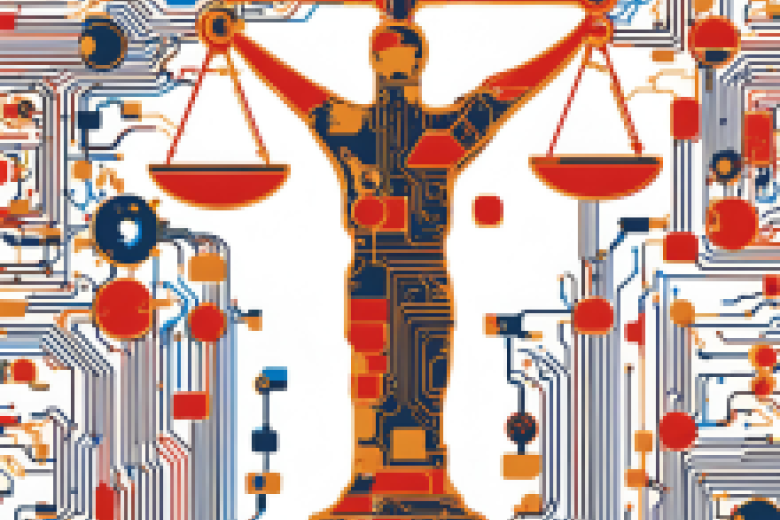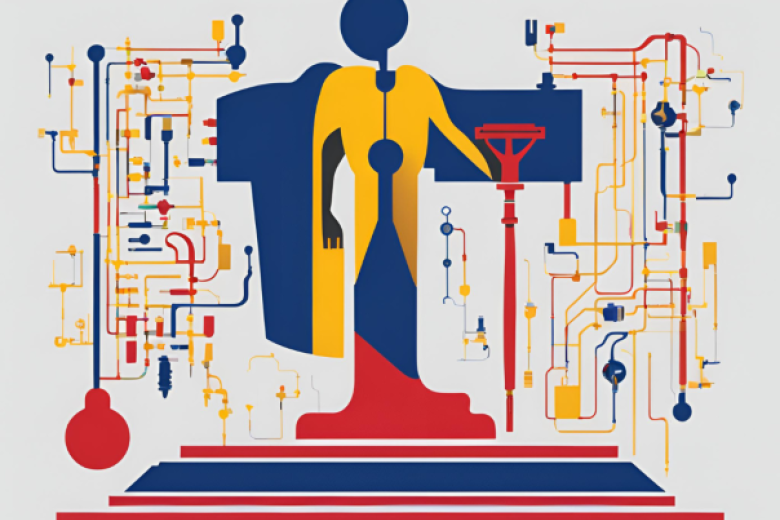Research
The Maastricht Law and Tech Lab adopts an innovation through co-creation approach to research. Our research is carried out through close and complete collaboration between lawyers, data scientists and knowledge engineers. By jointly designing and conducting research projects in co-creation, our interdisciplinary approach fuels knowledge discoveries and prototypes of legal technology that have mutual value for law, data science and knowledge engineering.
Considering all angles!
The digital society begs new questions about how innovative technologies interact with law and justice. This interaction between law and technology essentially goes in two directions: Technology for Law, and Law for Technology.
Explore our current research projects, flagship projects, PhD projects, past research projects, and publications below!
Explore Our Current Research
CoCoDa
CoCoDa
Description
The research project is motivated by the fact that online platforms increasingly play a key role in our societies. This creates systemic risks to democracy, such as undermining freedom of information and online privacy. These risks are, however, merely symptoms of a root cause: the high concentration of control and data (CoCoDa) with dominant online platforms.
Both computer science (CS) and legal scholarship (Law) have been developing countermeasures, but typically in disciplinary silos. In CS, researchers have tried to find workarounds for the lack of explicit research platform data access methods by combining available technical methods (e.g., data scraping, blackbox testing, network traffic analysis). However, those approaches face challenges, stemming from platform-imposed restrictions and limited legal support. In Law, the EU enacted the Digital Services Act (DSA) in late 2022 to enable vetted researchers to better access dominant online platforms. However, there is a significant risk that, without sufficient technical support and alignment, these promising legal mechanisms become moot in practice.
To overcome the challenge of having computational methods without (legal) teeth, or legal solutions that are not implementable or miss important technical aspects, there is a strong need for CS and Law to work closely together to develop a mutual understanding and integrated implementations of concepts, viewpoints and methods.
Researchers
Konrad Kollnig, Gijs van Dijck, Simon Mayer (University of St. Gallen, Aurelia), Tamò-Larrieux (University of Lausanne), Elena Simperl (Open Data Institute)
More Information
Ongoing (since 2024)
Free the Law
Description
Most individuals are likely to face a legal issue at some point in their lives, including problems related to housing, debt, consumer issues and employment. However, their lack of understanding of how to navigate these complex issues prevents them from resolving these issues, causing significant costs to the individuals and society. In a variety of activities, including several PhD studies, we explore new avenues of using technology and AI to increase access to justice, e.g. by bridging the legal literacy gap through the development of automated legal aid systems. This research aims to help people resolve their legal problems and interact with the legal system, thus increasing well-being in society and trust in legal institutions.
Activities include the:
- Development of several expert-annotated datasets (e.g., the Belgian Statutory Article Retrieval Dataset (BSARD) for studying retrieval models aimed at returning the relevant legislation to a short legal question posed in layman’s terms; the Long-form Legal Question Answering (LLeQA) dataset to investigate models aimed at generating long-form responses to any statutory law questions in an interpretable way).
- Exploration of hybrid search as a strategy to improve in-domain retrieval performance when high-quality domain-specific data is unavailable for training.
- Testing of a graph-augmented dense statute retriever model that leverages the topological structure of legislation to enrich the article content information and enhance retrieval performance.
- Leveraging of AI to improve fact descriptions by users to improve legal information retrieval.
- Automated summarisation of court decisions and improved evaluation thereof.
- Exploration and evaluation of the use of large language models combined with legal expertise to perform legal tasks, e.g. to provide legal information and fill in forms.
- Use of generative AI to resolve disputes in novel ways.
Researchers
Antoine Louis, Semyak Sheth, Lyra Hoeben-Kuil, Hannes Westermann, Jerry Spanakis, Gijs van Dijck, Mindy Nunez Duffourc
More Information
- Interpretable Long-Form Legal Question Answering with Retrieval-Augmented Large Language Models
- Statutory Article Retrieval via Graph Neural Networks
- Statutory Article Retrieval Dataset in French (BSARD)
- Semi-Structured Legal Reasoning and Drafting with Large Language Models
- Legal aid and AI help poor Americans close 'justice gap'
RegTech4AI
RegTech4AI
Description
The General Data Protection Regulation (GDPR) is a cornerstone of the regulation of AI in the EU. It seeks to facilitate the flow of data across the EU while protecting citizens’ fundamental rights – including data protection and privacy. Even though the GDPR is now more than 7 years old, there remain significant gaps between the law and practice. For example, past research by the project lead showed that less than 10% of mobile apps fulfil the minimum legal requirements regarding consent – one of the core principles of GDPR. As the EU is introducing the AI Act (i.e. its first law aimed directly at AI), it is likely that again – like with GDPR – enforcement will be lagging and that businesses will be overwhelmed by the legal obligations. In response, RegTech4AI will research regulatory technologies (RegTech) to assist enforcement agencies and businesses with AI regulation, and thereby bolster trust in AI systems among citizens.
Researchers
Konrad Kollnig, Gijs van Dijck, Qian Li, Kamil Szostak, Bram Rijsbosch, Lucas Giovanni Uberti-Bona Marin
GreaseX: Tackling Digital Harms
GreaseX: Tackling Digital Harms
Description
Harms in user interfaces are widespread. In current scholarship, some of these harms are often referred to as dark patterns or deceptive practices. Other harms, such as hate speech or age-inappropriate content, are also frequently mentioned. However, such categorisations can be too simplistic: what is perceived as harmful often depends greatly on the individual. This is why, in this project, we are exploring how to use state-of-the-art machine learning methods to modify user interfaces on desktop and mobile devices in real-time, and to build personalised models to reduce digital harms. In other words, rather than relying on platforms (and Elon Musk) to take the lead on content moderation, we have been working to devolve some of the power and responsibility for content moderation to end-users.
Researchers
Siddhartha Datta (University of Oxford), Konrad Kollnig
LAWNOTATION: Platform for Labeling Legal Data
LAWNOTATION: Platform for Labeling Legal Data
Description
The LAWNOTATION project aims to develop an infrastructure that allows researchers to making legal data and annotation schemes (current and future) accessible for annotation and analysis purposes, to develop an annotation platform for analysing the linguistic and legal characteristics of legal documents, and to build a user-friendly interface.
A team of developers will work closely together with researchers on the improved access to legal materials. LAWNOTATION is an initiative of the Digital Legal Studies cluster in the Sectorplan Social Sciences and Humanities (SSH) - Rechtsgeleerdheid and other Dutch universities that are collaboratively working on questions related to the digitalisation of law. The research is made possible by the Platform Digitale Infrastructuur SSH
Researchers
prof. Gijs van Dijck (Maastricht University), Hannes Westermann (BISS), Shashank Chakravarthy (BISS), Carlos Aguilera (BISS), prof. Martijn Wieling, prof. Michel Vols (Groningen University), prof. Tom van Engers, prof. Guiseppe Dari-Mattiacci, dr. Balasz Bodó (University of Amsterdam), prof. Andre Janssen, prof. Pietro Ortolani, dr. Pieter Wolters (Radboud University), prof. Floris Bex (Tilburg University / Utrecht University), Robert van Doesburg (TNO / University of Amsterdam).
Case Law Explorer: Finding Precedents in Case Law
Case Law Explorer: Finding Precedents in Case Law
Description
Traditionally, court decisions are manually read and analysed in legal education and legal research. However, network analysis based on court citations have shown the potential to answer questions such as: What are the landmark cases in a corpus of decisions?, which clusters of decisions can be distinguished, and do certain courts cite different decisions? This project aims at bridging the gap between available computer science techniques for law, and the non-technical legal community. It will provide legal researchers and law students a software platform that visualises large sets of court decisions as a network, where nodes represent cases and edges represent citations. Users can navigate through the corpus, spot clusters of cases, and access the full case documentation of any selected case in the network.
This project will provide legal researchers, students, and practitioners an accessible gateway to available technologies applicable to their studies, research or work. This project was funded by a Comenius Teaching Fellows 2019 grant and by a Surf Open Leermaterialen (Web of Law) 2020 grant.
Researchers
Gijs van Dijck, Shashank Chakravarthy, Carlos Aguilera (former researchers: Kody Moodley, Marcel Schaper, Michel Dumontier, Shashank Chakravarthy, Maxine Hanrieder, Bogdan Covrig, Turgay Saba, Pedro V. Hernández Serrano).
Waste-free, Automated, Legally certain, Legitimate - Euro (WALL-E) transportation and logistics
Waste-free, Automated, Legally certain, Legitimate - Euro (WALL-E) transportation and logistics
Description
The “WALL-E” transportation and logistics research agenda focuses on multidisciplinary and comparative studies addressing multiparty legal structures in transport chains and societal preferences for sustainable technological advancements. It also aims to unite experts from various fields, including law, social sciences, economics, business administration, logistics, and computer science, to explore complex societal issues related to the development of intelligent transport systems.
Researchers
Marta Kolacz
CyberCrimeLinker: Online Criminals as Authors
CyberCrimeLinker: Online Criminals as Authors
Description
This research addresses the challenge of connecting vendors involved in illegal activities on online markets, a critical task for law enforcement agencies. The manual investigation becomes impractical and resource-intensive with the vast number of vendors and the frequent use of multiple aliases or migration between markets. By leveraging machine learning and authorship attribution techniques, we aim to identify and link these vendors across different platforms, including darknet markets for illegal vendors and escort markets for potential human trafficking vendors. This provides a scalable and effective solution for uncovering hidden connections and aiding in more efficient resource allocation for law enforcement. Additionally, we establish the groundwork to promote ethical authorship attribution by proposing responsible guidelines, ensuring that these approaches are used ethically and responsibly.
Researchers
Vageesh Saxena, Gerasimos Spanakis, Gijs Van Dijck
Global Privacy Control for Mobile
Global Privacy Control for Mobile
Description
Apps and their integrated third-party libraries often collect large amounts of data from Android users to show personalised ads. This can be highly invasive and problematic. Privacy law in California (as of 2021) and Colorado (as of 2024) requires apps and websites to respect opt-outs from ad tracking via the Global Privacy Control (GPC). However, this standard has not yet been widely transposed into mobile apps, and consumer cannot make use of their legally mandated privacy protections. This is why we’ve been studying the level of compliance with the GPC, building the necessary interdisciplinary methodology to do so, and creating reference implementations of GPC for Android. We closely work with responsible regulators in this research.
Researchers
Konrad Kollnig, Sebastian Zimmeck (Wesleyan University)
Current Research Projects
-
Ongoing (since 2025)HANDEL
-
Ongoing (since 2025)CoCoDa
-
Free the LawOngoing (since 2024)
-
Ongoing (since 2024)RegTech4AI
-
Ongoing (since 2020)GreaseX: Tackling Digital Harms
-
Ongoing (since 2022)LAWNOTATION: Platform for Labeling Legal Data
-
Ongoing (since 2019)Case Law Explorer: Finding Precedents in Case Law
-
Ongoing (since 2024)Waste-free, Automated, Legally certain, Legitimate - Euro (WALL-E) transportation and logistics
-
Ongoing (since 2020)CyberCrimeLinker: Online Criminals as Authors
-
Ongoing (since 2023)Global Privacy Control for Mobile
Explore Our Flagship Projects
Legal AI for All
The Legal AI for ALL project, examines the potential for technology to improve the application and interpretation of, and compliance with, the law.

Am AI the Law?
Am AI the Law? examines machines’ ability to conduct legal tasks equivalent to or indistinguishable from legal experts and other types of expert information.

Ruling Tech
Ruling Tech aims to promote legal resilience in the wake of emerging technologies through better integration of the law as a proactive system.
